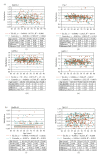Epigenetic changes in response to tai chi practice: a pilot investigation of DNA methylation marks
- PMID: 22719790
- PMCID: PMC3375016
- DOI: 10.1155/2012/841810
Epigenetic changes in response to tai chi practice: a pilot investigation of DNA methylation marks
Abstract
Tai chi exercise has been shown to improve physiological and psychosocial functions, well-being, quality of life, and disease conditions. The biological mechanisms by which tai chi exerts its holistic effects remain unknown. We investigated whether tai chi practice results in positive epigenetic changes at the molecular level. Design. The DNA methylation profiles of sixty CpG-dinucleotide marks in female tai chi practitioners (N = 237; 45-88 years old) who have been practising tai chi for three or more years were compared with those of age-matched control females (N = 263) who have never practised tai chi. Results. Six CpG marks originating from three different chromosomes reveal a significant difference (P < 0.05) between the two cohorts. Four marks show losses while two marks show gains in DNA methylation with age in the controls. In the tai chi cohort all six marks demonstrate significant slowing (by 5-70%) of the age-related methylation losses or gains observed in the controls, suggesting that tai chi practice may be associated with measurable beneficial epigenetic changes. Conclusions. The results implicate the potential use of DNA methylation as an epigenetic biomarker to better understand the biological mechanisms and the health and therapeutic efficacies of tai chi.
Figures

Similar articles
-
Tai chi improves depressive symptoms among community-dwelling older persons by mediating BDNF methylation: A preliminary study.Geriatr Nurs. 2022 Mar-Apr;44:137-142. doi: 10.1016/j.gerinurse.2022.01.015. Epub 2022 Feb 10. Geriatr Nurs. 2022. PMID: 35152066
-
The psychosocial effect of Tai Chi on nursing home residents.J Clin Nurs. 2010 Apr;19(7-8):927-38. doi: 10.1111/j.1365-2702.2009.02793.x. J Clin Nurs. 2010. PMID: 20492037 Clinical Trial.
-
Tai Chi exercise is more effective than brisk walking in reducing cardiovascular disease risk factors among adults with hypertension: A randomised controlled trial.Int J Nurs Stud. 2018 Dec;88:44-52. doi: 10.1016/j.ijnurstu.2018.08.009. Epub 2018 Aug 24. Int J Nurs Stud. 2018. PMID: 30195124 Clinical Trial.
-
The potential positive epigenetic effects of various mind-body therapies (MBTs): a narrative review.J Complement Integr Med. 2021 Jun 22;19(4):827-832. doi: 10.1515/jcim-2021-0039. eCollection 2022 Dec 1. J Complement Integr Med. 2021. PMID: 34463076 Review.
-
Ameliorative effects of Tai Chi on cancer-related fatigue: a meta-analysis of randomized controlled trials.Support Care Cancer. 2018 Jul;26(7):2091-2102. doi: 10.1007/s00520-018-4136-y. Epub 2018 Mar 21. Support Care Cancer. 2018. PMID: 29564620 Review.
Cited by
-
Epigenetics and Colorectal Neoplasia: the Evidence for Physical Activity and Sedentary Behavior.Curr Colorectal Cancer Rep. 2015 Dec;11(6):388-396. doi: 10.1007/s11888-015-0296-z. Epub 2015 Sep 19. Curr Colorectal Cancer Rep. 2015. PMID: 27212896 Free PMC article.
-
Precision Physical Therapy: Exercise, the Epigenome, and the Heritability of Environmentally Modified Traits.Phys Ther. 2018 Nov 1;98(11):946-952. doi: 10.1093/ptj/pzy092. Phys Ther. 2018. PMID: 30388254 Free PMC article.
-
Epigenetic Modifications as Outcomes of Exercise Interventions Related to Specific Metabolic Alterations: A Systematic Review.Lifestyle Genom. 2019;12(1-6):25-44. doi: 10.1159/000503289. Epub 2019 Sep 23. Lifestyle Genom. 2019. PMID: 31546245 Free PMC article.
-
Effects of Tai Chi in diabetes patients: Insights from recent research.World J Diabetes. 2024 Jan 15;15(1):1-10. doi: 10.4239/wjd.v15.i1.1. World J Diabetes. 2024. PMID: 38313854 Free PMC article.
-
How can we modulate aging through nutrition and physical exercise? An epigenetic approach.Aging (Albany NY). 2023 Apr 20;15(8):3191-3217. doi: 10.18632/aging.204668. Epub 2023 Apr 20. Aging (Albany NY). 2023. PMID: 37086262 Free PMC article. Review.
References
-
- Klein PJ, Adams WD. Comprehensive therapeutic benefits of Taiji: a critical review. American Journal of Physical Medicine and Rehabilitation. 2004;83(9):735–745. - PubMed
-
- Wang C, Collet JP, Lau J. The effect of Tai Chi on health outcomes in patients with chronic conditions: a systematic review. Archives of Internal Medicine. 2004;164(5):493–501. - PubMed
-
- Wayne PM, Kaptchuk TJ. Challenges inherent to T’ai Chi research: part I—T’ai Chi as a complex multicomponent intervention. Journal of Alternative and Complementary Medicine. 2008;14(1):95–102. - PubMed
-
- Taggart HM, Arslanian CL, Bae S, Singh K. Effects of T’ai Chi exercise on fibromyalgia symptoms and health-related quality of life. Orthopaedic Nursing. 2003;22(5):353–360. - PubMed
LinkOut - more resources
Full Text Sources

